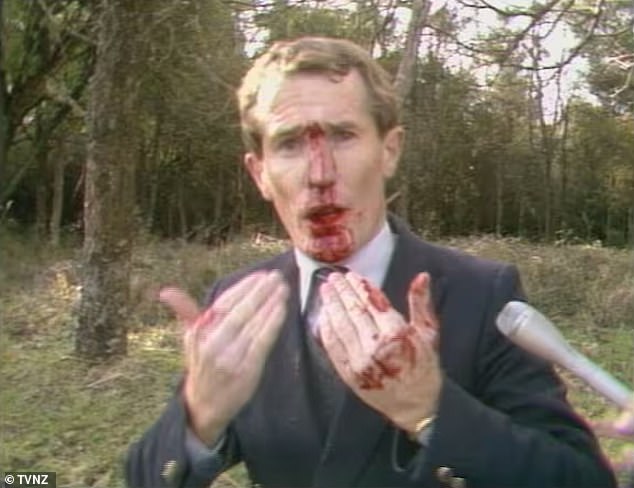Famous broadcaster behind one of TV’s most shocking moments dies
Broadcasting legend Rod Vaughan, known for one of television’s most shocking moments, has died at the age of 77.
The veteran reporter died in Christchurch on Sunday after a short battle with cancer, an obituary confirmed.
Vaughan worked at the forefront of New Zealand news for almost 40 years and in 1985 was the subject of a shocking live broadcast in which he was punched by politician Bob Jones.
Vaughan is survived by his wife Lois, his three children Nicholas, Richard and Larissa, his stepdaughter Ruth Buckley and his 10 beloved grandchildren.
“Rod was a highly respected and tenacious journalist, a keen pilot and golfer. He joins his brothers Robbie, Roy and Peter, and his parents Paul and Phoebe in heaven. Forever in our hearts,” the statement read.
Vaughan, who was born in Jersey and lived in the UK before moving to New Zealand, will be remembered by his loved ones at a memorial service held at 10am on Friday.
Vaughan is known as one of New Zealand’s most experienced television journalists, having reported on many current affairs and primetime news programmes during his 40 years in front of the state television camera.
However, he is probably best known for his shocking TV incident with the leader of the short-lived New Zealand Party, Bob Jones.
Broadcasting legend Rod Vaughan (pictured in 2020), known for one of TV’s most shocking moments, has died at the age of 77
In 1985, Vaughan gained notoriety when he was left with a bloody face after a tense confrontation with the controversial politician, in which he was punched.
The incident occurred on the banks of the Tongariro River, where Vaughan and his team had travelled by helicopter to question Jones about his party’s contribution to the ousting of Rob Muldoon in the 1984 election.
However, Jones was unfazed by their presence while he was fishing and jumped out of a bush, punching both Vaughan and his cameraman Peter Mayo.
“He turned completely red! He was screaming and shouting and every word started with an ‘F’ or a ‘C’ and then he kind of trotted off the bank of the river,” Vaughan told Seven Sharp in 2020 of the now-infamous incident.
The announcer explained that Jones jumped on them and attacked Mayo, then punched him full in the face when he tried to calm him down.
“I walked up behind Bob and said in a very sweet tone, ‘Come on Bob, you don’t have to do this.’ He turned around and hit me with a left hook between the eyes, knocking me flat on the ground,” he explained.
‘I ended up rolling over the riverbank, almost into the damn water.’

Vaughan worked at the forefront of New Zealand news for almost 40 years and became infamous when he was punched live on radio by politician Bob Jones in a shocking broadcast (pictured)
Despite the tense confrontation, Vaughan said he and Jones buried the hatchet years later, after a get-together hosted by his colleague, where they enjoyed bottles of wine and “really got along.”
The shocking incident inspired Vaughan to name his 2012 autobiography, Bloodied But Not Beaten.
During his distinguished career, Vaughan worked as a reporter and producer for TVNZ for more than 35 years.
TVNZ Editor-in-Chief Phil O’Sullivan paid the following tribute after his death: ‘Rod worked on some of the greatest current affairs programmes in the history of this country.
“He had a strong sense of justice and an aversion to dishonesty. His contribution to investigative journalism is immense.”
Vaughan, who began his journalistic career as a writer for The NZ Herald and The Dominion, also worked for TV3’s 60 Minutes for eight years.
In his 2012 autobiography, he wrote that “a sense of fair play and a distaste for deceit and dishonesty” drove him into the industry after studying at Wellington Polytechnic.
